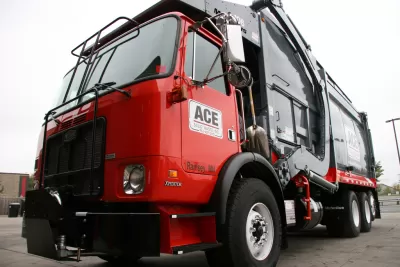Instead of letting trash collection companies compete to serve customers, several Minnesota cities are negotiating contracts on behalf of their citizens. The measure, which reduces garbage truck traffic, has prompted backlash.

A debate is raging in several Minnesota cities over organized trash collection. For the StarTribune, John Reinan writes, "Battles over organized trash collection, meaning that a city arranges for pickup by one designated hauler, have been fought in more than a dozen metro communities in recent years. Some, like Fridley and Roseville, backed down in the face of opposition. Others, like Bloomington and St. Anthony, went ahead. But no matter the outcome, it's rarely been a smooth process."
The rationale for organizing trash pickups is environmental as well as aesthetic. "Cities that have adopted organized collection say it's more sustainable. Fewer big trucks on the street means less fuel used, fewer emissions released and less wear and tear on roads. Noise and congestion are reduced, and streets are safer."
But opponents claim the practice limits their ability to hunt for deals among the competing collection companies. Some phrase their protests in the language of individual liberties, referencing a culture of public lawmaking gone overboard.
FULL STORY: Residents, cities scrap over who picks up garbage

Alabama: Trump Terminates Settlements for Black Communities Harmed By Raw Sewage
Trump deemed the landmark civil rights agreement “illegal DEI and environmental justice policy.”

Planetizen Federal Action Tracker
A weekly monitor of how Trump’s orders and actions are impacting planners and planning in America.

The 120 Year Old Tiny Home Villages That Sheltered San Francisco’s Earthquake Refugees
More than a century ago, San Francisco mobilized to house thousands of residents displaced by the 1906 earthquake. Could their strategy offer a model for the present?

In Both Crashes and Crime, Public Transportation is Far Safer than Driving
Contrary to popular assumptions, public transportation has far lower crash and crime rates than automobile travel. For safer communities, improve and encourage transit travel.

Report: Zoning Reforms Should Complement Nashville’s Ambitious Transit Plan
Without reform, restrictive zoning codes will limit the impact of the city’s planned transit expansion and could exclude some of the residents who depend on transit the most.

Judge Orders Release of Frozen IRA, IIJA Funding
The decision is a victory for environmental groups who charged that freezing funds for critical infrastructure and disaster response programs caused “real and irreparable harm” to communities.
Urban Design for Planners 1: Software Tools
This six-course series explores essential urban design concepts using open source software and equips planners with the tools they need to participate fully in the urban design process.
Planning for Universal Design
Learn the tools for implementing Universal Design in planning regulations.
Clanton & Associates, Inc.
Jessamine County Fiscal Court
Institute for Housing and Urban Development Studies (IHS)
City of Grandview
Harvard GSD Executive Education
Toledo-Lucas County Plan Commissions
Salt Lake City
NYU Wagner Graduate School of Public Service





























